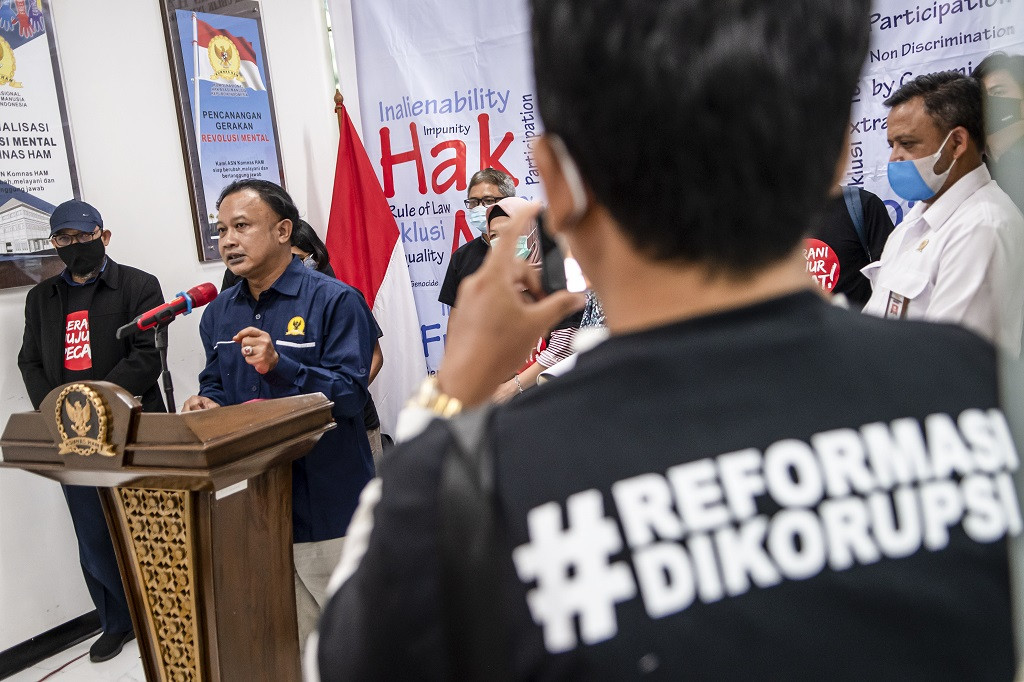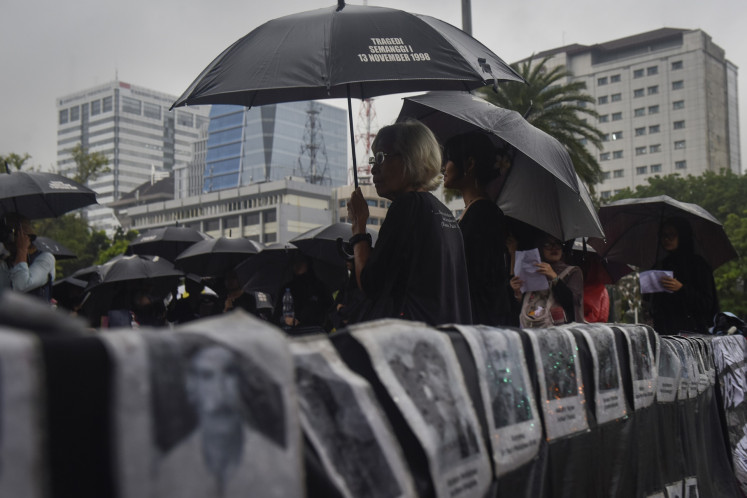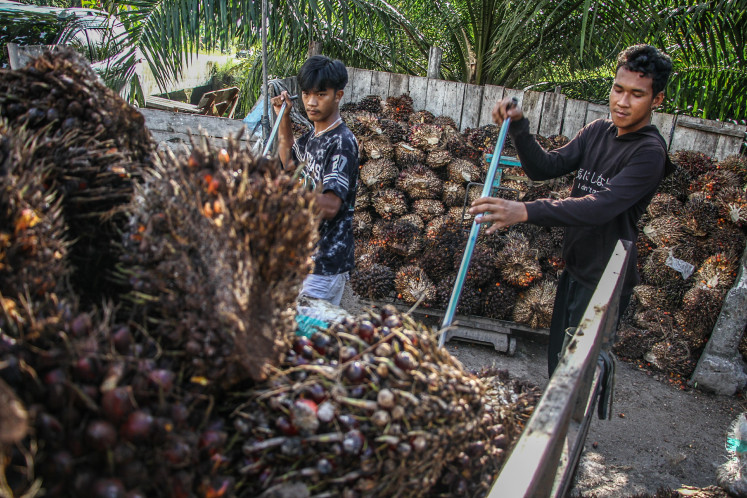Popular Reads
Top Results
Can't find what you're looking for?
View all search resultsPopular Reads
Top Results
Can't find what you're looking for?
View all search resultsIndonesia demonstrates that civil society as a backbone of democracy is a myth
Many cases show that the existence of civil society organisations in the context of authoritarian politics do not necessarily introduce a regime change and in a democratic context they face many limitations in advancing a liberal political order. Indeed, the global trend of authoritarianism affirms the failure of civil society in defending democratic institutions from being hijacked by reactionary populist politics.
Change text size
Gift Premium Articles
to Anyone
 National Commission on Human Rights (Komnas HAM) commissioner Choirul Anam (second left) talks to journalists in Jakarta on May 24, 2021 after receiving a report from senior Corruption Eradication Commission (KPK) investigator Novel Baswedan (left) and other employees pertaining to the civic knowledge test for the antigraft body employees. (Antara/M. Risyal Hidayat)
National Commission on Human Rights (Komnas HAM) commissioner Choirul Anam (second left) talks to journalists in Jakarta on May 24, 2021 after receiving a report from senior Corruption Eradication Commission (KPK) investigator Novel Baswedan (left) and other employees pertaining to the civic knowledge test for the antigraft body employees. (Antara/M. Risyal Hidayat)
It is a myth that civil society is a backbone of democracy.
Many cases show that the existence of civil society organisations in the context of authoritarian politics do not necessarily introduce a regime change and in a democratic context they face many limitations in advancing a liberal political order. Indeed, the global trend of authoritarianism affirms the failure of civil society in defending democratic institutions from being hijacked by reactionary populist politics.
The destruction of an Indonesian anti-corruption body that happened under the administration of President Joko "Jokowi" Widodo, which is supported by many former civil society activists, illustrates such a tendency.
The limits of civil society activism
The approach employed by Indonesia’s civil society movements, particularly dominated by middle class reformers organised within various non-government organisations (NGOs), tends to view the weakness of technocratic institutional designs and capacities and other non-political aspects as the direct cause of complex political problems. This view has made civil society activists rely on institutional and policy designing as well as reformist actors to generate reform under which entrenched vested interests remain unchallenged and could even appropriate those institutions and actors.
With such an approach, the main strategies being used tend to be elitist, mostly undertaken through various forms of policy intervention or political lobbying, or by sporadically infiltrating the power centres. Middle class reformers also have little interest in radically transforming established socio-political order and are inclined to avoid radical methods such as strikes, occupations or acts of sabotage. They contend that this strategy only leads to violent conflict, turmoil, instability and disorder; and this endangers their own privileges and social positions.
They are more interested in advancing and advocating neoliberal discourses on good governance, civil and political rights, and government accountability, which explains why many pro-democracy activists heavily rely on reform institutions such as the KPK (the Corruption Eradication Commission) to combat corruption and promote good governance. This is despite the fact that predatory practices have become deeply ingrained in the way power and wealth are accumulated. This means that corruption is not simply a problem related to poor institutional designing, but more structural as a result of particular organisation of power that requires the use of extra-economic means in the accumulation of wealth.
Their reform agendas also tend to address certain issues as they arise, which also leads to a short-term focus. As no long-term agendas being formulated, they also have no clear leadership, structure and organisation. These features contribute to make the changes by civil society activists insignificant in transforming the way power is organised, leading to further consolidate entrenched predatory interests in appropriating democratic institutions.
The weakening of the KPK
The second amendment of Law No. 30 of 2002 on the KPK initiated by President Jokowi’s administration in 2019 has ensured the removal of many significant investigative powers of Indonesia’s anti-corruption body.
This is an example of the failures of civil society in Indonesia because it has received support from numerous former civil society activists who are now supporters of the government. Further, these changes were made possible by the failure of civil society activists to significantly influence legislative processes. Meanwhile, protests against revisions to the KPK on the streets and through social media also tend to be sporadic and disorganised, making them too weak to block attempts to cripple the KPK.
Even before these changes, the KPK suffered from many institutional limitations. Its establishment was a manifestation of technocratic institutional designing in addressing endemic corruption problems with which entrenched predatory interests remain unchallenged. It came about because of the confluence of two agendas: pressure from reformasi movements to end corruption, collusion and nepotism (KKN) and neoliberal demands to dismantle ‘market-distorting policy choices’.
The KPK has indeed become a threat to predatory interests that rely on the corrupt political environment to accumulate power and wealth. However, the KPK, and other neo-liberal institutions have never entirely eliminated vested interests. As a result, these interests continue to thrive and are able to seize neoliberal technocratic agendas and influence a number of democratic institutions, including the KPK. Many corruption cases involving powerful elites, such as Soeharto’s family, remain untouched.
From its inception, the KPK has at times also been appropriated by powerful elites at the national level to restrain ambitious local political figures that aspire to expand their power and wealth. Most of the cases investigated by this agency implicated political figures and government officials at the local level.
It is during the administration of President Jokowi—who is widely viewed as a reformist politician and predominantly supported by a number of former pro-democracy activists and scholars—that the interests of predatory elites are being consolidated. Unlike in Yudoyono’s era, there has not been action by political parties supporting social protests against the weakening of the KPK.
Jokowi’s government and its supporters have mobilised a narrative of Islamist threat by claiming that the KPK is being infiltrated by elements of Islamic radicalism. This narrative justifies the appointment of KPK commissioners who have poor track records in anti-corruption and who have links to corrupt police institutions. Transparency International Indonesia ranks Indonesian police as the fifth most corrupt institution in Indonesia. Reminding of the gecko versus crocodile conflicts, this institution also constantly opposes KPK’s anti-corruption efforts.
Further, activists-turned-government-supporters supported the 2019 changes to the law which weakened the KPK (which the government also claimed was necessary to prevent it from being hijacked by Islamist groups).
Since 2019, some civil society organisations have responded to attempts by the Jokowi administration to weaken the KPK further by organising protests across the country under the banner of #ReformCorrupted. However, their strategy has tended to be sporadic, lacking in leadership and structure, and their demands and strategies are frequently at odds with one another. Consequently, the demonstrations organised by civil society movements have failed to effectively counter predatory interests, making the further paralysation of the KPK unavoidable.
***
The full version of this article has been published by Melbourne Asia Review, Asia Institute, University of Melbourne.










